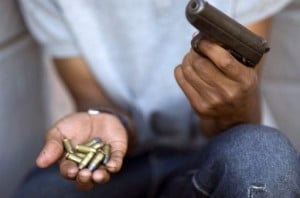Is South Africa's murder rate in the top three globally?
This article is more than 8 years old
 A young gang member in the Cape Flats shows a gun and ammunition, in November 2012. Gang murders are frequent in the district. Photo: AFP/Rodger Bosch
A young gang member in the Cape Flats shows a gun and ammunition, in November 2012. Gang murders are frequent in the district. Photo: AFP/Rodger Bosch“SA in the top three of murder rates globally,” tweeted eNCA reporter Bianca Bothma this week from an Institute for Race Relations (IRR) briefing.
The institute presented its analysis of the “evolution of crime and violence in South Africa” over the last two decades ahead of the release of the country’s annual crime statistics Tuesday. Bothma’s tweet included a picture of one of the IRR’s charts, titled “International murder rates (2012)”.
The chart showed the murder rate per 100,000 people in countries such as Germany, Australia, Malawi and the US. South Africa’s rate was wedged between that of Columbia and El Salvador.
At first glance, the table looked like a ranking, but the text above the table shows the IRR sought to highlight that - in their view - the burden of violence in South Africa “equates on some measures to countries experiencing civil insurrections”.
So where does South Africa rank globally?
The United Nations Office on Drugs and Crime (UNODC) homicide statistics show that in 2012 South Africa had a rate of 30.7 homicide deaths per 100 000 of the population, with 16,259 murders committed in that year.
This placed South Africa eighth - after Honduras (91 homicide deaths per 100,000 inhabitants), Venezuela (53.6), Belize (45.1), El Salvador (41.5), Jamaica (39.1), Guatemala (34.6) and Saint Kitts and Nevis (33.4). - 25/09/15
Additional reading:
Yes, South Africa’s murder rate is 7 times higher than the United States’
Where murder happens in South Africa
FACTSHEET: South Africa’s official crime statistics for 2013/14

Add new comment